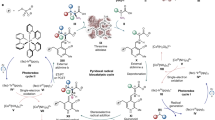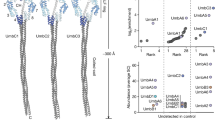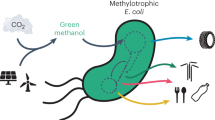Abstract
MUTANT 83-1 of Escherichia coli, isolated by the penicillin method1, is blocked at an early stage in aromatic synthesis; it responds to a quadruple supplement of tyrosine, phenylalanine, tryptophane and p-aminobenzoic acid. Whereas the quantitative requirements for the three amino-acids are similar to those of mutants with single requirements for these compounds, growth is very slow with 0.005 µgm./ml. of p-aminobenzoic acid, a concentration sufficient for optimal growth of a mutant blocked specifically in p-aminobenzoic acid synthesis. Higher concentrations of the acid, up to 1 µgm./ml., provide more rapid, yet less than normal, growth of mutant 83-1. Normal growth-rate, however, appears with the addition of shikimic acid (a 2,3,4,5-tetrahydrogallic acid).
This is a preview of subscription content, access via your institution
Access options
Subscribe to this journal
Receive 51 print issues and online access
$199.00 per year
only $3.90 per issue
Buy this article
- Purchase on Springer Link
- Instant access to full article PDF
Prices may be subject to local taxes which are calculated during checkout
Similar content being viewed by others
References
Davis, B. D., Proc. U.S. Nat. Acad. Sci., 35, 1 (1949).
Davis, B. D., Experientia, 6, 41 (1950).
Davis, B. D., J. Biol. Chem. (in the press).
Author information
Authors and Affiliations
Rights and permissions
About this article
Cite this article
DAVIS, B. p-Hydroxybenzoic Acid: a New Bacterial Vitamin. Nature 166, 1120–1121 (1950). https://doi.org/10.1038/1661120b0
Issue Date:
DOI: https://doi.org/10.1038/1661120b0
This article is cited by
-
Zur Kenntnis der Wirkungsmechanismen von p-Hydroxybenzoesäureäthylester und Sorbinsäure im Kohlenhydrat- und Eiweißstoffwechsel einiger Schimmelpilze
Zeitschrift für Lebensmittel-Untersuchung und -Forschung (1965)
Comments
By submitting a comment you agree to abide by our Terms and Community Guidelines. If you find something abusive or that does not comply with our terms or guidelines please flag it as inappropriate.



